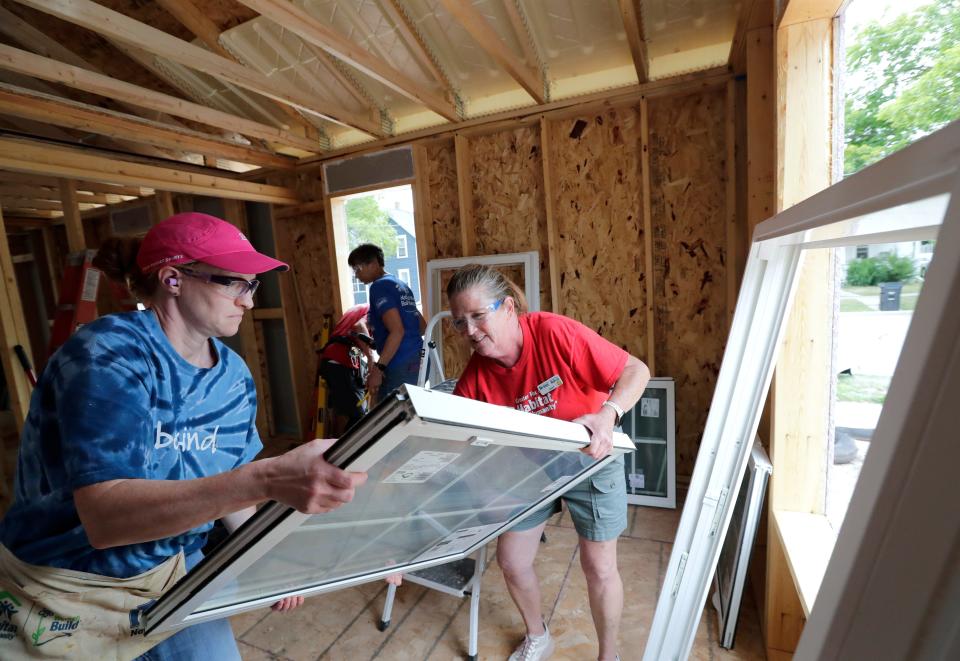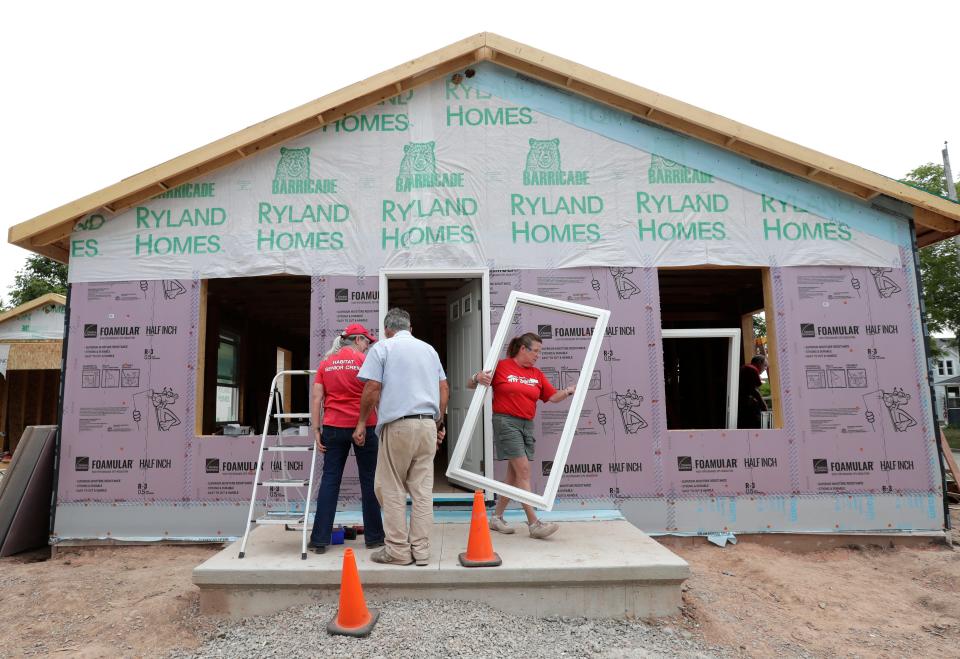Habitat for Humanity homes are not free, but here's how the application process works
APPLETON - Kathryn Noll-Arias was pregnant with her first child when she saw a news story about a family moving in to their Habitat for Humanity home.
"I remember thinking how nice it would be to have a home for my own family and raising my children with a backyard," Noll-Arias said. At the time, she and her husband were living in a small apartment, both working jobs to provide for their family.
Noll-Arias said the news story inspired her to apply for the program, but she soon learned that it wouldn't be as easy as the media might have made it look.
"I was under the same misconceptions that most people are," Noll-Arias said. "All I saw was somebody getting handed their keys."
Years later, in 2009, Noll-Arias and her family were able to finally move into their Habitat home, but it took a lot of hard work.
In reality, the program is more than just filling out an application and receiving the keys to a "free," brand-new home. Applicants must meet certain, specific requirements to even move on to the second application.
CEO of Greater Fox Cities Habitat for Humanity John Weyenberg said that these misconceptions could come from a number of different factors, but clarifying the reality of the program is important for everyone — especially future applicants.
Over the last 30 years, the Fox Cities' Habitat affiliate has built and repaired 852 homes and served over 5,000 people in the area, its website reports.
Here are some things applicants might not know about the process of getting a Habitat for Humanity home.
What qualifies a family for a Greater Fox Cities Habitat for Humanity home?
The first step to getting a Greater Fox Cities Habitat for Humanity home is to fill out the first application. This application helps the program coordinators learn about the applying family, what needs they have and if they meet all the required guidelines.
Habitat looks for three factors when reviewing a family's application; the need for better housing, the willingness to partner and the ability to pay.
"For some families, it's an accessibility issue," Weyenberg said. "So someone in the home might have some mobility issues and their home isn't accessible to them. We look at need in a variety of ways, but most of the families we're working with are living in housing that's not currently suitable for their current situation."
Families income is closely evaluated to ensure they have the ability to pay their mortgage consistently once their home is finished.
The homebuyer guidelines state applicants must be comfortable with a monthly mortgage payment that would be set at 25% to 30% of their gross monthly income and have enough income through stable employment or other forms of permanent income to afford a home and all basic living expenses.
There is also a minimum and maximum income limit families must meet in order to qualify.
"The reason for the minimum is families have to have stable, steady income, because they're going to have a mortgage, they have to have income," Weyenberg said. "The reason for the maximum is we want to serve families who most often would not be able to qualify for a conventional mortgage, who wouldn't be able to walk into a bank and get a loan."
The willingness to partner is for applicants to understand the work they'll be doing under the program. Families must put in a certain amount of "sweat equity," the unpaid labor invested by homeowner partners in building their own and other Fox Cities Habitat houses, the website explains. They can also volunteer at a Habitat ReStore and attend required educational classes.
Some of the offered classes include workshops on budgeting, homeownership, lawncare, repairing things in your home and how to be a good neighbor.
Two-parent families must complete 500 hours of sweat equity and single-parent families must complete 300.

Additionally, applicants must meet the following guidelines:
Debt to Income ratio must be less than 15% (10% or less is ideal)
Credit score must be 576 or higher
All household members must clear national sex offender registry check
All applicants must be a permanent resident or U.S. Citizen
Given Wisconsin is a marital property state, married couples must apply jointly or separated, divorce must be finalized
Applicants must clear a criminal background check
All adult household members must sign a general release for a background check and debt verification
More information on guidelines for the Greater Fox Cities Habitat for Humanity can be found on its website.
Are Habitat homes free?
Despite what many people may think, Habitat homeowners still must pay a mortgage on their home.
The mortgage on a Habitat home is reduced, usually 25% of a families income, and there is no interest on the loan, making it easier and quicker for the loan to be paid off.
"The industry standard has been that if you spend 30% or less of your income on housing, it's considered affordable," Weyenberg said. "Because we're working with families that have a little more limited income, we changed it to 25%, which allows them to have 75% of their income for food, healthcare, childcare and all of the other expenses of life."

The decreased mortgage is meant to allow Habitat families to flourish in other parts of their life, while still maintaining the responsibility of homeownership to set them up for successful futures.
Noll-Arias was able to go back to school and earn her degree after her family moved into their Habitat home.
"My husband was able to work, I was able to drop down to about 25% of the hours that I was working, which allowed me to go to school and get a four year degree and I've been working in human services for about seven years now," Noll-Arias said.
Habitat homeowners are also strongly urged to stay in their homes for 30 years, depending on the type of mortgage agreement they have, they could end up having to repay their entire mortgage back if they sell the home before the 30-year time stamp.
"Not every family can afford their full mortgage in 30 years, so we issue them a second mortgage and if they choose to sell their home before a certain period of time, they have to pay all or a portion or all of that mortgage back," Weyenberg said.
Addressing misinformation about Habitat families
Noll-Arias said the misconception that Habitat homes are free could've possibly came from the idea that most non-profit organizations usually give things away without asking for things in return.
Because of these misconceptions, neighbors of Habitat families might have negative feelings towards the homes being built nearby, like believing that because they are low-income, they will bring crime and trouble.
"What I tell people is 'these are your neighbors today, they're people who live in your community today, their income is just less than others,'" Weyenberg said.
Weyenberg said a lot of the families they help are already working paying jobs, they're just in financial situations that make it hard for them to actually purchase a home on their own.
"The issue has gotten exponentially worse in the last five years, because the cost of housing has gone through the roof," Weyenberg said. "There is a huge segment of our population that could not afford to buy a home on the open market today."
Habitat's reputation is what it is because of their high expectations from the families they help to serve, Noll-Arias believes.
"It's 18 months of dedication and years to come afterward, there's a lot you do before you get to the point of being a homeowner and building your own home," Noll-Arias said.
She said when she hears misinformation about Habitat for Humanity she tries her best to redirect the narrative any way she can.
"I think listening for those things along the way and gently informing that that is not the correct information is super important," Noll-Arias said. "Nobody likes to be controversial, but misinformation isn't helping anybody also."
Reach Jelissa Burns at 920-453-5107 or jburns1@gannett.com. Follow her on Twitter at @burns_jelissa or on Instagram at burns_jelissa.
This article originally appeared on Appleton Post-Crescent: Greater Fox Cities Habitat for Humanity dispels program misconceptions

